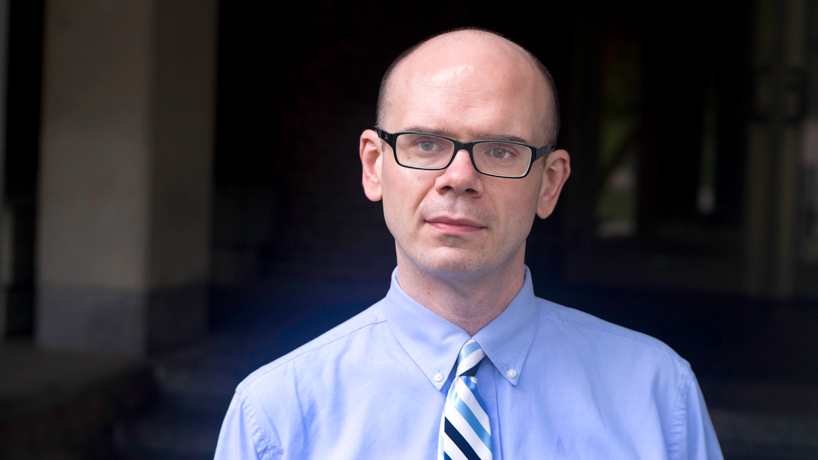
John Nanney, director of UMSL’s Community Psychological Service, helped to organize the June 13 event, which drew about 150 attendees. Nanney’s current research focuses on gun violence as a public health issue. (Photo by August Jennewein)
Recent events in Ferguson, Mo., have brought renewed attention to issues of race, policing, social justice and more across the region and nation. Last Saturday, the conversation on the University of Missouri–St. Louis campus turned to mental health.
Counselors, psychiatrists, social workers, teachers and psychologists gathered at UMSL for an all-day conference titled “Beyond Ferguson: Mental Health Services and the Crises in Disadvantaged Urban Communities.”
“The core of the conference was a discussion of the mental-health effects of the events in Ferguson, the specific responses of mental health to these events and how psychology sheds light on the chronic underlying issues,” said John Nanney, clinical assistant professor and director of UMSL’s Community Psychological Service. “We also examined how mental-health services can address these underlying issues to prevent future tragedies.”
UMSL presenters at the June 13 event included Nanney, Associate Professor Tara Galovski, doctoral student Ashley Parker, Associate Professor Matthew Taylor and Associate Clinical Professor Jerry Dunn, executive director of Children’s Advocacy Services of Greater St. Louis.
Nanney shared a few of the conference’s takeaways for mental-health professionals as well as citizens and laypeople with UMSL Daily. He also touched on lessons from his own recent research.
In examining the events that took place in Ferguson this past year, what sort of underlying challenges did the conference seek to address?
We looked at the role of historical trauma and cultural/racial identifications in shaping people’s reactions and interpretations to the events in Ferguson, the impact of structural disadvantage/poverty/racism on the lives of African Americans and the challenges facing law enforcement, including stress and trauma exposure.
Your own presentation, “Urban Gun Violence: Clarifying Risk Factors and Developing Interventions,” seems as timely as ever. In a nutshell, what’s been the focus of your research on this topic?
Before joining the UMSL faculty last year, I worked in New Orleans conducting research on urban gun violence. My work focused on developing interventions for individuals who were hospitalized at a Level I trauma center following violent (typically gunshot) injury.
The aim of the intervention was to reduce the chances that these patients would either engage in future violence or be violently injured again (the risk is quite high). This intervention is currently being evaluated, and as part of this process we studied behavioral risk factors associated with risk of re-injury in a recently published study (“Criminal Behavior and Repeat Violent Trauma: A Case-Control Study”).
Are there specific ways in which your work at the trauma center in New Orleans has impacted your perspective on St. Louis’ own challenges?
I think my prior work in New Orleans made me more attuned to the role of socioeconomic disadvantage and racism in shaping emotional and behavioral health. In particular, it made me aware of the unique challenges faced by young African American men, particularly in high crime/high poverty areas.
Although Ferguson is not the same as New Orleans or even north [St. Louis] city, in one way or another racism/disadvantage in general – and the barriers faced by African American men in particular – are central to the issues faced in each of these communities.
As director of UMSL’s Community Psychological Service, how do you see St. Louis moving “Beyond Ferguson” in positive ways?
I think there is increased dialogue and collaboration between stakeholders such as various mental-health professionals and government entities. For example, this conference was a joint effort by the UMSL Department of Psychological Sciences and clinics and the St. Louis Association of Black Psychologists. There appears to be somewhat more – and more honest – discussion of the role of race and structural disadvantage in St. Louis and the nation.
In addition, some community-based interventions have been launched that are aimed at increasing the emotional health of the St. Louis community, such as Alive and Well STL, and of African Americans in particular. One example is the Emotion Emancipation Circles sponsored by the Association of Black Psychologists.
Any advice for non-mental-health professionals who are eager to be part of the solution(s) when it comes to these difficulties facing our communities?
Talk to people who may be racially/culturally different from you, and when you do, just focus on really listening. Don’t just wait for your turn to give your opinion, but really listen. And participate in community efforts like Alive and Well STL or the Resilience Coalition’s listening sessions.















